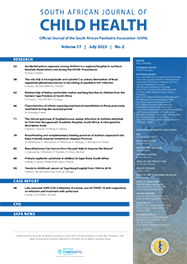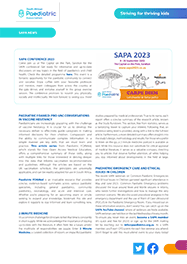Research

Pathways to school completion for young mothers: Are we winning the fight?
Abstract
Background. Policy initiatives in South Africa are directed at promoting the educational and developmental outcomes of girls and young women (age 15 - 24 years). These include decreasing the incidence of HIV infection, teenage pregnancy and gender-based violence, and increasing school attendance and economic empowerment. This article explores the contexts of pregnancy, motherhood and schooling in a sample of young mothers in an urban area in Johannesburg, South Africa.
Methods. This ethnographic study, based in a poor urban area in Johannesburg, South Africa, recruited 30 young mothers aged 18 - 20 years with whom open-ended interviews were conducted. Each mother was contacted 3 months after the first interview, and again 3 months later. In addition to the first round of 30 interviews, 9 young mothers were interviewed in the second round, and 6 young mothers in a third round. A total of 45 interviews were conducted.
Results. The findings illustrate how young mothers mediate constraints and challenges to continue and complete their schooling when confronted with a mistimed and unintended pregnancy. A combination of factors converge to facilitate or impede school continuation and completion. Key barriers include school policy and discrimination against pregnant learners, limited options for childcare, and high levels of poverty and unemployment that strain existing scarce family resources.
Conclusions. The pathway to school completion is complex and non-linear. Three particular interventions that support school attendance and completion for young mothers have value: the child support grant, the availability of crèches in the community, and a school policy that upholds the principle of inclusivity for pregnant learners and young mothers.
Author's affiliations
N Pillay, School of Public Health, University of the Witwatersrand, Johannesburg, South Africa
Full Text
Cite this article
Article History
Date published: 2018-09-04
Article Views
Full text views: 917

.jpg)



Comments on this article
*Read our policy for posting comments here